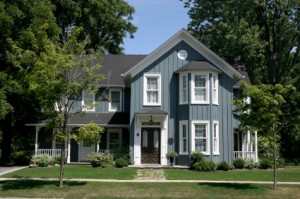 "Is this a good neighbourhood?" It's a question that I'm asked all the time while out with buyers. Most tell me that the neighbourhood is their top priority when choosing a new home – even more important than price.
"Is this a good neighbourhood?" It's a question that I'm asked all the time while out with buyers. Most tell me that the neighbourhood is their top priority when choosing a new home – even more important than price.
There are a few general key factors when considering a new neighbourhood. They are important to almost every buyer I encounter, but some will rank higher on your tailored list than others.
(1) How Safe is it?
One of the things I love about Markham is that you often see people outside their homes, working in their yards or walking their dogs. Neighbours who interact with one another create a safer and more pleasant environment. Everyone looks out for everyone else.
Markham is a very safe place to live. But like all large towns, some parts are better than others. To find out details of the types of crimes that have occurred in specific Markham neighbourhoods, you can contact the local police department and ask for a police report. You can also check the local newspaper, the Markham Economist.
(2) What are the Schools Like?
One of the signs of a good neighbourhood is a well-kept and well-functioning school. And if you have children, this is probably one of the first considerations when looking for a good neighbourhood to raise your family.
Is the neighbourhood in a good school district? This is important whether you have children or not. Remember, good schools increase property values and they are an excellent indicator of the direction the neighbourhood is heading. We have some of the highest ranking Ontario schools here in Markham.
Also, consider how your child will get to school. Is there public transportation? Can he or she walk? How far is it to drive?
(3) Any Future Development Slated?
Investigate what’s going on in the community and what future construction projects are being planned. Information on future development can be found at Town of Markham or through the local Board of Trade.
For example, if the neighbourhood has ‘mixed land use zoning' that includes commercial, then vacant lots or abandoned buildings could be used for commercial developments like a fast food restaurant or high-rise condos. This could change the feel of the neighbourhood and impact the property values.
Higher property values, increase in noise, loss of privacy and traffic problems are just a few of the changes that can occur. Not all of these changes are bad, but you need to consider the impact and how you would feel if any of these should happen.
(4) How is Access to Transportation?
Drive the commute during rush hour or take public transportation and see how long it takes you to get to your places of interest. Is the public transportation that is available a reliable alternative to driving?
(5) What's the Future for Property Values?
Real estate agents are a valuable source of information (if I do say so myself). Ask your realtor whether multiple offers are being made in the neighbourhood you are interested in and whether the gap between list and sale prices is decreasing and how property values have evolved over the years.
The best insider information, however, still comes from the residents that live there. Don’t be afraid to speak with residents and get their feelings about the area. After all, when you're planning on purchasing a home, keep in mind that you're not just buying a house, you're investing in a community.
Have you ever wished you took more time to investigate a neighbourhood before buying into it? I’d love to hear your comments…